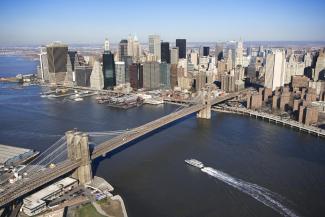
Do the preparation task first. Then read the text and do the exercises.
Preparation
Some of the biggest and most expensive transportation projects in the world have involved building bridges. Bridges are crucial links that carry cars, trucks and trains across bodies of water, mountain gorges or other roads. As a result, they are one of the most important aspects of civil engineering and are subject to intense scrutiny, especially when they collapse.
Bridge collapses can be tragic events, leading to loss of life and serious property damage. That's why bridge engineers, designers and builders must always take their jobs very seriously. The best way for them to prevent these accidents is to understand why bridges collapse in the first place. Understanding bridge collapses can lead to major changes in the design, construction and safety of future building projects. The following are main reasons why bridges fall.
Fire
Historically, more bridges were made of wood and were much more susceptible to fire. This was particularly true of old-fashioned train bridges, where the spark created by the steel wheels and steel tracks could sometimes cause a bridge to catch fire and burn to the ground.
During construction
A large number of bridge accidents occur during the construction of the bridge itself. These accidents are often due to an error made by the engineers, such as a miscalculation. The bridge collapses under its own weight, and this can be deadly for the workers on it at the time.
Earthquakes
Earthquakes damage all structures, including bridges. Luckily, this kind of collapse is relatively infrequent, especially with modern bridges. Engineers have learned to design bridges in earthquake zones on areas that are much more resistant to movement.
By defect
Some bridge collapses are mysteries, and engineers only realise why after they conduct a complete investigation. In some cases, this could happen because inferior-quality material was used in the construction, or because of a defect in a key piece of the bridge. In other cases, the bridge was designed only to support a certain amount of weight and no more.
Boat or train crash
Both of these kinds of accidents are extremely rare, but boats and trains can cause a bridge to collapse for different reasons. With trains, it's the velocity of the impact that can bring a bridge down. With boats, it's the very large mass they have that can bring about the collapse, even if they are moving very slowly when it occurs.
The best way to avoid bridge failures is to plan for them. Modern technologies that can detect structural weakness, safer working environments and better designs can all help to reduce these terrible accidents.




Hello Ola Jamal
There is no audio on the pages in our Reading skills sections, but there is either audio or video on all of the pages in our Listening and Speaking skills section. On those pages, though, the texts are true oral texts -- in other words, they are not people reading out loud a written text, but people speaking to each other. There is currently only one section on our site where you can hear someone read aloud a text -- this is our Podcasts for professionals section.
By the way, we are working hard on a lot of new pages for the Listening section and hope to publish them in the next month or so, so please keep an eye out of that section!
All the best
Kirk
The LearnEnglish Team